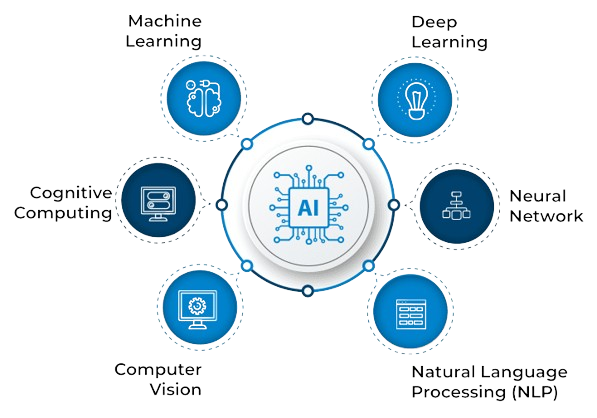Following Key Topics to Cover in AI-
1) Introduction to Artificial Intelligence
- What is AI?
- History and Evolution of AI
- Types of AI: Narrow vs. General AI
- Applications of AI in Various Industries
2) Machine Learning Fundamentals
- Introduction to Machine Learning
-
Supervised, Unsupervised, and Reinforcement Learning
-
Machine Learning Algorithms: Regression,
Classification, Clustering
- Model Evaluation and Validation
3) Deep Learning and Neural Networks
- Neural Network Basics
- Deep Learning Architectures: CNNs, RNNs, GANs
- Training Deep Learning Models
- Transfer Learning and Fine-Tuning
4) Natural Language Processing (NLP)
- Text Preprocessing and Tokenization
- Word Embeddings and Word2Vec
- Sequence Models: LSTM, GRU
- Language Generation and Understanding
5) Computer Vision
- Image Processing Techniques
- Convolutional Neural Networks (CNNs)
- Object Detection and Recognition
- Image Segmentation and Feature Extraction
6) AI Ethics and Responsible AI
- Ethical Considerations in AI Development
-
Fairness, Accountability, and Transparency in AI
- AI Bias and Mitigation Strategies
- Regulatory Frameworks and Guidelines
7) AI Applications and Case Studies
- AI in Healthcare
- AI in Finance and Banking
- AI in Autonomous Vehicles
- AI in Customer Service and Chatbots
Mastering AI concepts and techniques is essential for
unlocking the full potential of artificial
intelligence in various domains. This curriculum
covers foundational topics required to build
intelligent systems, analyze data, and solve complex
problems using AI technologies. By acquiring these
skills, you can drive innovation, improve
decision-making, and create impactful solutions that
transform industries and societies.



